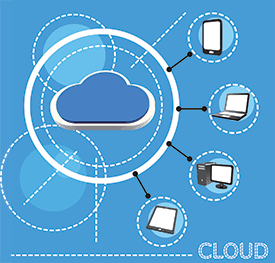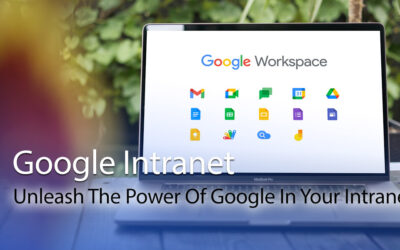Hosted Intranet Security
Considering a hosted intranet solution, what are the security risks? Not a year goes by that we don’t hear of a data breach affecting a major U.S. company. Research shows cyber security incidents have grown by 38 percent in the U.S. since 2014 and costs American businesses $300 billion to $1 trillion every year. However, cyber attacks don’t just affect big business. CIO reports that 36 percent of cyber attacks are perpetrated against small to mid-sized businesses. Of those falling victim, 60 percent go out of business within six months. Just one cyber-attack can cost a small business a minimum of $9,000 in hard costs. Many businesses simply can’t recover from the “soft” damages, such as the firm’s reputation and the integrity of its e-commerce platform.
Is the Cloud Safe?

Hosting your intranet on the cloud is like choosing to trust your home security to a professional security company instead of simply locking your windows. Homeowners are often preoccupied with home maintenance and become complacent about security. A security company, however, is always striving to provide superior service, upgrade its tools and beat the competition. Similarly, small and mid-size business owners are focused on running their business, often not even having a dedicated IT staff. Using cloud-based technology for your intranet is actually a more secure option. However, note that the CIO experts emphasized security is a “general risk management” issue. Even the most secure network can be breached without appropriate policies in place and precautions that are enforced. So, there are steps that business owners can take to ensure their intranet security goes beyond the technology itself. Intranets are particularly vulnerable because we often view them as strictly internal. However, sensitive data is stored there, and a breach can set up a cyber attack throughout your network. Here are five intranet security risks to look out for.
Five Risks to Watch
- Complacent Attitudes. Employees feel a sense of security on their intranet. It’s where they go to connect socially with their peers, engage with company leaders, find documents necessary for their jobs, watch internal training videos or post their personal profiles and photos. Employees feel ownership and belonging to their intranet, a sense that no one on the outside can get in. As a result, they often engage in risky behavior, such as weak passwords, clicking unknown attachments they receive through personal messaging or sending files that are not encrypted. Combat this attitude by raising awareness about security threats and ensure that employees know the best way to share and use information stored on the intranet. Additionally, have a policy that insists employees change passwords regularly and requires a certain length and combination of characters.
- Rogue Employees. As much as you trust your staff, the danger of a disgruntled employee is always present. It is often impossible to predict such behavior, but companies can decrease risk by using an intranet solution that allows for tiered site permissions. For example, MyHub’s platform allows access to be granted or restricted by job roles, teams, individual pages, modules, specific content or by each unique file. Since these permissions can be given and taken away quickly, managers can immediately remove access privileges when an employee is terminated.
- Not Maintaining Permissions. Intranet access can easily be given. However, as roles and jobs evolve over time, many add permissions but fail to take way access that the employee no longer requires. Have a process in place that regularly assesses roles and access, and updates appropriately.
- Remote Access.
One of the biggest assets of cloud technology is that software and files can be accessed from anywhere. Your team can find files, submit their time sheets, communicate with other employees or catch up on company news while commuting home, all through a mobile intranet. However, many companies are opting for a Bring Your Own Device (BYOD) program. Can accessing the company network from so many unmonitored devices really be safe? Yes, if your intranet cloud vendor has the right security in place. MyHub’s site pages and data are only accessed through a secured SSL connection. What does this mean? It means that you can focus on engaging your employees through your intranet and not worry about secure access. Secure Socket Layer (SSL) is the standard security technology that establishes an encrypted link between a web server and a browser. All data passed between that secure connection remains private and secure. It is the same technology protocol that millions of websites use to protect their customer’s online transactions.
- Reliability. Keeping data safe involves more than just protecting it from rogue employees or hackers. Protecting your data requires that it is safe and always available. This is another area where a cloud-hosted intranet is advantageous. Trusting the IT professionals that host your intranet ensures that your data is always up and running. They are in the business of securing data. Ask your third-party vendor about their backup plans. What protection do they have from a natural disaster or power outages? What if your intranet grows and you fill up your allotted space? Can more easily be purchased with no downtime? Not all vendors are created equal. Ask how much downtime their clients have experienced in the last six months. Don’t be afraid to ask for a reference.
A Trusting Relationship
Opting for a hosted intranet means relinquishing a certain amount of control, making many business owners uncomfortable. However, the advantages offered by using an external cloud technology vendor often outweigh this reservation. Here are three big reasons small to medium-sized copies choose a hosted intranet.
- Get superior IT services. Selecting a reputable vendor aligns you with high-quality IT support. When you are in the middle of a project and need immediate help, a vendor with excellent customer support will provide it. Talk directly with the software designers to get your issues resolved quickly.
Always be up-to-date. Did you know most security breaches are caused by outdated software? Never miss an update when you partner with a vendor. Intranet partners roll out updates quickly and efficiently, so you always have the most recent and most secure version.
- Save money. One of the key benefits of cloud technology is cost savings. Companies do not have to spend money on hardware or other associated implementation costs. This includes the cost of security measures.
MyHub Intranet Solutions Limited provides secure, cloud-based intranet solutions for companies across industry sectors. Securely access files and communicate with employees. Store sensitive company data and provide a platform for employees to engage socially. Contact us to learn more.


 One of the biggest assets of cloud technology is that software and files can be accessed from anywhere. Your team can find files, submit their time sheets, communicate with other employees or catch up on company news while commuting home, all through a mobile intranet. However, many companies are opting for a Bring Your Own Device (BYOD) program. Can accessing the company network from so many unmonitored devices really be safe? Yes, if your intranet cloud vendor has the right security in place. MyHub’s site pages and data are only accessed through a secured SSL connection. What does this mean? It means that you can focus on engaging your employees through your intranet and not worry about secure access. Secure Socket Layer (SSL) is the standard security technology that establishes an encrypted link between a web server and a browser. All data passed between that secure connection remains private and secure. It is the same technology protocol that millions of websites use to protect their customer’s online transactions.
One of the biggest assets of cloud technology is that software and files can be accessed from anywhere. Your team can find files, submit their time sheets, communicate with other employees or catch up on company news while commuting home, all through a mobile intranet. However, many companies are opting for a Bring Your Own Device (BYOD) program. Can accessing the company network from so many unmonitored devices really be safe? Yes, if your intranet cloud vendor has the right security in place. MyHub’s site pages and data are only accessed through a secured SSL connection. What does this mean? It means that you can focus on engaging your employees through your intranet and not worry about secure access. Secure Socket Layer (SSL) is the standard security technology that establishes an encrypted link between a web server and a browser. All data passed between that secure connection remains private and secure. It is the same technology protocol that millions of websites use to protect their customer’s online transactions. Always be up-to-date. Did you know most
Always be up-to-date. Did you know most 




0 Comments